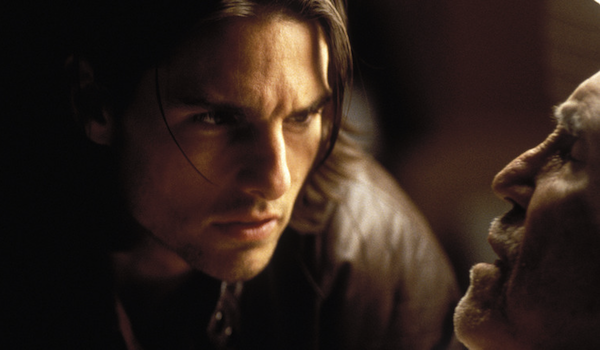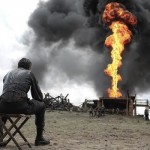Magnolia Review
Posted on December 15, 2009 By John Gilpatrick 1990s, John's Hall of Fame, Movie Reviews
After the critical and financial success he had with “Boogie Nights,†New Line essentially gave P.T. Anderson the freedom to do anything he wanted. The result is “Magnolia,†a picture that wouldn’t have been made, couldn’t have been made, without such freedom. This is a bold motion picture, a 3-hour tale about fate and atonement spanning the lives of ten individuals in modern-day California, at least for the first 150 minutes. Then something happens, something to rival the most jaw-dropping and audacious moments in cinematic history, something that forces the characters to “wise up†and teaches them about the consequences of their actions, for as the good book says, “We may be done with the past, but the past ain’t done with us.â€
“Magnolia†opens with a fantastic prologue narrated by Ricky Jay. We are treated to three extraordinarily coincidental stories that must be seen to be believed. Are they chance or fate? The narrator believes the latter, for these aren’t just things that happen.
For the remainder of the film, we follow the lives of our 10 main characters. At the center of the action is Earl Partridge (Jason Robards). Earl is a television producer who is losing his battle with cancer and he seems to only have a few hours left. Caring for Earl is a genial nurse named Phil Parma (Phillip Seymour Hoffman). While Phil is trying to deal with the bipolar (or are they drug-addled) histrionics of Earl’s much younger, and suicidal, wife, Linda (Julianne Moore) Earl asks Phil to contact his estranged son Frank (Tom Cruise). Frank is a sex guru (more like a sex televangelist actually) and author of “Seduce and Destroy,†a series of seminars teaching men how to get any girl they want. Frank is holding an interview with a television reporter who asks him some uncomfortably probing questions of his past when he gets a call from Phil. He wants nothing to do with his father, but thinks this might be his best chance to say all the things he’s always wanted to say to the man he’s denied knowing his whole life.
Meanwhile, Earl’s most successful show, “What Do Kids Know,†is in its 33rd year on the air. Its host, Jimmy Gator (Phillip Baker Hall), also is dying of cancer (he has two months left), but he hasn’t really told anybody other than his loving wife Rose (Melinda Dillon). He tries to tell his estranged daughter, the cocaine-addicted Claudia (Melora Walters), but she goes ballistic at the sight of him. During a routine call on a noise complaint, LAPD Officer Jim Kurring (John C. Reilly) meets Claudia and asks her out but is plagued by a number of other problems at work (a dead body he found in a woman’s closet, the gun he lost while pursuing a suspicious jaywalking suspect).
All this happens while “Whiz Kid†Donnie Smith suffers a life ruined by child fame. He holds the record for most money won on “What Do Kids Know,†but his parents stole his money. Since then, he’s been struck by lightning and has had numerous problems with money. His next ill-guided purchase will be braces (he is in love with a bartender who also has braces), but he hasn’t quite figured out how to pay for them. He mulls things over at a bar while “What Do Kids Know†plays in the background. On the show, Stanley (Jeremy Blackman) is two days away from breaking Donnie’s record. Stanley’s father is “subtly abusive†toward his son, and over the course of the show, Stanley realizes he is being used by everyone and won’t stand for it any longer.
Got all that?
The entire film is predicated on showing how connected these characters are, and Anderson uses every aspect of the film to demonstrate this. The music flows flawlessly through different scenes (such as the one in which Stanley answers a question on the game show by singing a lyric from the opera Carmen, and the actual song plays throughout the next seemingly unrelated scene with Jim and Claudia). And in one important scene (listen to the lyrics, absolute perfection), the characters all sing along to the same Aimee Mann song. Much of the music is sung by Mann, but the more traditional score (by Jon Brion), which mixes in well with Mann’s songs, is incredibly effective in conveying a sense of building chaos until the big finale.
The editing and cinematography are also tremendous assets to the overall success of the film. Dylan Tichenor uses some great techniques in transitioning from story to story, such as closing in on the television screen and then being at the taping of “What Do Kids Know.†He has a difficult job, because many of the characters do not cross paths through the film, but their lives are still meant to be connected. Roger Elswitt’s cinematography is also exceptional. Rather than rapidly cutting in between stories, he uses long, unbroken takes, such as the one through the backstage area of the television studio.
“Magnolia†features one of the finest ensemble casts in recent memory, and every single performance is spot-on. Tom Cruise received an Oscar nomination for his work as the charismatic Frank who is haunted by his past. Other standouts include Julianne Moore as the guilty and grieving Linda and Jason Robards as the dying Earl.
The event in the final 20 minutes of “Magnolia†is nothing short of jaw-dropping. Nothing can prepare you for what happens. I won’t get into it further here (although I should, it’s been ten years!). But it really brings together the overall themes of the bleak picture before it and sets things up well for the more hopeful epilogue that follows it. “Magnolia†tells us we may be through with the past, but the past ain’t through with us (several characters utter this line further showing the connections between them). Most of the characters suffer for most of the film, usually through their own fault, but they aren’t capable of change. The big event is the impetus for the characters to change their ways, and the epilogue shows them in a better state having (for the most part) atoned or accepted the events of their pasts.
“Magnolia†did not have much luck as far as Oscar was concerned. Tom Cruise picked up a nomination for Supporting Actor (he won the award at the Golden Globes), while the film was also recognized in the Best Original Screenplay and Best Original Song categories, respectively. The Academy should be ashamed for not recognizing it for Best Picture (the nominees in 1999 instead were “American Beauty,†“The Insider,†“The Cider House Rules,†“The Green Mile,†and “The Sixth Senseâ€), Best Director, Best Editing, Best Cinematography, and Best Score, among others.
This is a daring, courageous film, and the finest moment in P.T. Anderson’s young, brilliant career. He went on to direct Adam Sandler’s finest moment in “Punch-Drunk Love,†and was finally recognized for his work in 2007’s “There Will Be Blood.†The latter was one of the best films of the 2000s, but if “Magnolia†had been released just a few weeks later (in 2000 rather than 1999), it would have been at or near the top of that list.
1999, 4 Stars, Alfred Molina, Jason Robards, John C. Reilly, Julianne Moore, Magnolia, Melora Walters, Paul Thomas Anderson, Philip Seymour Hoffman, Phillip Baker Hall, Tom Cruise, William H. Macy















